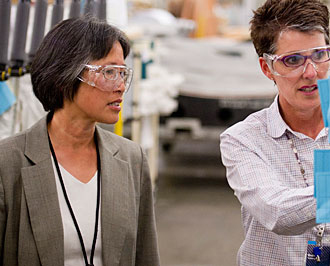Jeanne Yu Leads Push for Energy Efficient Planes
As Boeing’s director of environmental performance Jeanne Yu is in charge of rapidly developing and proving out technologies and materials that can make the company’s airliners more fuel efficient.
The best way to do that is to deploy promising advances on actual aircraft, then take them on a series of test flights, she says. That program is called the ecoDemonstrator, a collaboration between Boeing, American Airlines and the FAA. Under the program Boeing develops a new test bed airplane every year and uses it to run a series of experimental flights.
In 2012 the ecoDemonstrator project uses a retrofitted Boeing 737-800 on loan from American Airlines. In place of the usual rows of seats, the cabin is filled with racks of computers and monitoring equipment. The plane was flown for 45 days this summer over and around Glasgow, Montana.
“The goal of the ecoDemonstrator program is to accelerate integration of these technologies for more fuel efficient, quieter, cleaner, more advanced sustainable material solutions for the future,” Yu said. “We develop a whole new airplane only once every 10 years. That’s a long time in between airplanes. The ecoDemonstrator will help the product development team keep our learning ability fresh every year.”
Each technology being fitted on the airplane for testing has the goal of reducing fuel consumption, lowering noise, and testing the viability of sustainable materials. Technologies on the 2012 ecoDemonstrator 737-800 include improvements to wing and engine efficiency, better routing around weather and the use of an on-board fuel-cell for energy efficiency.
Boeing has improved fuel efficiency 70% since the introduction of its first airliners half a century ago. The company aims to improve efficiency another 20% with each new generation of airliner models. That’s the rate of improvement the industry must achieve to meet pressures on airlines to save fuel costs and reduce greenhouse-gas emissions. The ecoDemonstrator program is one way to speed up development and testing of new ways to achieve those savings.
The test-configured 737-800 incorporates a structural design called an adaptive trailing wing edge that lets it climb faster during takeoff for fuel savings and noise reduction.
Its cargo space holds a regenerative fuel cell that creates hydrogen from water with excess energy, then turns it into electricity for the plane’s systems at times of peak demand. The fuel cell could eventually lighten on-board generators and reduce demand on engines for better overall fuel efficiency.
The plane’s cockpit has a broadband satellite link and secure wireless network to let an iPad app provide real-time weather forecasts. Today’s technique of relying on weather radar plus old forecasts force pilots to give storms a wider berth than may be necessary, often costing upwards of 5% more fuel consumption.
Next year’s ecoDemonstrator will use a wide-body plane to demonstrate a ceramic engine nozzle that’s lighter and performs better in high temperatures than the titanium one used today to enable smaller, power efficient engines.
Other innovations being tested include the use of lightweight carbon fiber composites in places where weight savings can be substantial. Such materials were first used on 727s in the 1970s, and progressed with the 747, 767 and 777, before taking a big leap in the 787 Dreamliner which first entered service with All Nippon Airways last October.
Jeanne Yu grew up in Illinois. She enjoyed science and math in high school but credits her parents with helping her decide to become a mechanical engineer.
“One day my parents drove me to Michigan Tech University from our home in Illinois — more than 800 miles — to attend a workshop called ‘Women in Engineering.’ I listened to other women talk about their jobs and it was there that I decided I would become a mechanical engineer.”
She studied engineering at Stanford and earned a graduate degree in 1985.
Prior to heading up Boeing’s environmental performance department Yu led the team that designed the 787 Dreamliner’s cabin systems.

Jeanne Yu is Boeing's director of environmental performance.

